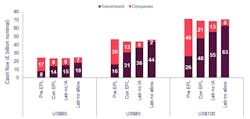UK offshore sector reacts to further proposed tax increase
Britain’s new Labour government has confirmed a further increase to the Energy Profits Levy (EPL) on offshore oil and gas production.
According to industry association Offshore Energies UK (OEUK), the announcement was issued in parliament as a late-afternoon policy paper without warning after Chancellor Rachel Reeves’ first fiscal statement.
The EPL will increase to 38% from Nov. 1, lifting the headline tax rate on upstream oil and gas activities to 78%.
In addition, the level will now stay in place until March 31, 2030, and the government has removed the EPL’s main 29% investment allowance for qualifying expenditure incurred, also signaling further reductions in capital allowances in calculating EPL profits. The extent of the reductions will only be made clear during Reeves’ Budget on Oct. 30.
The decarbonization allowance and the levy’s price floor—the Energy Security Investment Mechanism—will remain in place. This means that the levy will cease to apply if prices fall consistently to, or below, historically normal levels over a sustained period.
David Whitehouse, OEUK chief executive, said, “This is not [a] partnership working between government and industry. These announcements have been made without meaningful engagement with this sector. We recognize the government has significant spending challenges to manage, but today’s announcement will only serve to rock confidence further. The offshore energy sector supports over 200,000 jobs…"
He continued, "Announcements like this without engagement is no way to treat these hard-working people. We have tonight [July 29] spoken to the Treasury Minister and expect further and urgent engagement with the sector.”
Impact on offshore developments
Jersey Oil & Gas, one of the partners in the proposed re-development of the Buchan oil field and other fields in the central North Sea, said the Greater Buchan Area joint venture would carefully consider the impact of the tax changes to the economics of the development and project sanction.
The full implications, it added, would only be clear when the level of capital allowance claims available as deductions to the EPL are provided in the October budget.
Australian E&P independent Hartshead Resources, which is pursuing a redevelopment of Anning and Somerville and other fields in the UK’s southern gas basin, in partnership with RockRose Energy, said it had held talks with various political stakeholders to seek clarity on the future fiscal regime.
Hartshead added that it had actively lobbied and participated in discussions on the proposed changes and provided detailed information on the likely impact on the industry. All stakeholders “have expressed their desire to create a fiscal regime in the UK that will still attract and enable investment and activity in the sector,” the company said in an operations update.
An analyst's perspective
Chris Wheaton, an analyst with consultant Stifel, noted another statement by Chancellor Reeves yesterday: "If we cannot afford it, we cannot do it."
Stifel believes that could apply also to the windfall tax. “We think the government cannot afford to kill the industry through a massive increase in 'windfall’ taxes when there is no longer a 'windfall’ to tax.
“Our previous research has indicated that at risk is up to 100,000 jobs across the UK, damage to the skills base vital for the energy transition; and the UK's energy security reduced with domestic gas production falling 70% by 2030, requiring replacement by imported energy, with a consequent increase in emissions as domestic energy is replaced by higher-carbon imported energy.
“We hope that the forthcoming consultation with the industry considers these unintended potential consequences of increasing taxes too far.”
WoodMac: 'Levy could sound death knell for industry'
Wood Mackenzie suggested the latest EPL changes “could paralyze upstream investment for the duration of this parliament," if implemented in the October budget.
Theoretically the government would expect to raise annual average revenue of £1.2 billion, or £6 billion, over the next five years.
“After less than a month in power, the Labour government has continued in the same vein as the previous Tory government by making further temporary changes to the upstream tax system without addressing the uncertainty over the critical capital allowances,” said Graham Kellas, Wood Mackenzie's senior vice president of Global Fiscal Research.
But he warned, “The short-term gains of tweaking the EPL could result in the premature slowdown of investment across the upstream sector, which could lead to accelerated cessation of production.”
Extending the sunset clause to 2030 was a surprise, as the Labour party had previously stated it would keep its version of the EPL for the duration of the parliament, which will end in 2029.
To keep the clause in place until 2030 would retain one of the EPL’s critical flaws, the consultants claim, namely the misalignment of fiscal terms between the investment phase and the producing phase.
“The sunset date has extended so often investors will now pragmatically assume that the EPL is a permanent feature of the system, rather than assuming terms become more favorable in the future,” said James Reid, senior research analyst with Wood Mackenzie.





